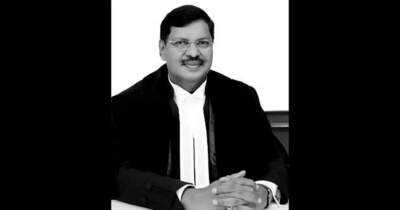On Monday, the Supreme Court indicated it would not pursue contempt charges against advocate Rakesh Kishore, who allegedly attempted to throw a shoe at Chief Justice BR Gavai on October 6.
A panel comprising Justices Surya Kant and Joymalya Bagchi acknowledged that Gavai had previously opted not to take action against Kishore. The justices questioned the appropriateness of initiating contempt proceedings when the chief justice had chosen to forgive the incident.
The court was addressing a petition from the Supreme Court Bar Association, which sought criminal contempt action against Kishore.
During the incident on October 6, Kishore reportedly hurled a shoe at Gavai, claiming the chief justice had insulted Hinduism. His anger stemmed from remarks made by Gavai regarding the restoration of a beheaded idol of Hindu deity Vishnu and a Supreme Court ruling that deemed punitive demolitions unconstitutional.
Despite the disruption, Gavai maintained his composure, instructed the court to continue, and later referred to the incident as a “forgotten chapter.”
Following the event, the Supreme Court Bar Association filed a petition for criminal contempt proceedings against Kishore. In a previous hearing on October 16, the court suggested it might be best to let the incident “die a natural death” rather than allow it to gain traction on social media.
On Monday, Advocate Vikas Singh, representing the Bar Association, informed the bench that the chief justice had initially chosen not to pursue charges. However, Kishore later gave media interviews boasting about his actions and threatening to repeat them.
Singh expressed concern that the situation was being glorified, stating, “The court has sufficient powers to ensure it does not happen again.”
Justice Kant remarked that Kishore’s actions constituted “serious and grave criminal contempt,” yet questioned whether the court should act when Gavai had already shown leniency.
Singh countered that Gavai's pardon was personal and should not bind the institution, adding that the public was making light of the incident. He suggested that if Kishore did not show remorse, he should be jailed immediately.
Singh also noted that Kishore appeared to feel emboldened by the chief justice's decision to let him go.
During the discussions, the court pondered whether another bench could initiate contempt proceedings if the presiding judge opted not to do so. Justice Bagchi stated that actions like throwing a shoe or shouting slogans are contemptuous, and it is typically left to the judge involved to decide on pursuing contempt.
However, Singh argued that Kishore's subsequent behavior, including his public comments and the glorification of his actions, could be interpreted as a new offense.
Justice Kant acknowledged that this raised a “serious concern” and indicated that the court would consider establishing guidelines to prevent the glorification of such actions.
Ultimately, the court decided against proceeding with criminal contempt for now but will contemplate issuing guidelines to deter the glorification of similar incidents.
You may also like

Throwback to when Russian streamer Stas Reeflay live streamed Valentina Grigoryeva's death for thousands to watch

Why Gary Neville is right to make Arsenal Premier League claim after Liverpool collapse

Jobe Bellingham makes decision on Man Utd move as Ruben Amorim expects signing

EAM Jaishankar meets Australian PM Albanese in Kuala Lumpur

Hugh Jackman, Sutton Foster make red carpet debut







